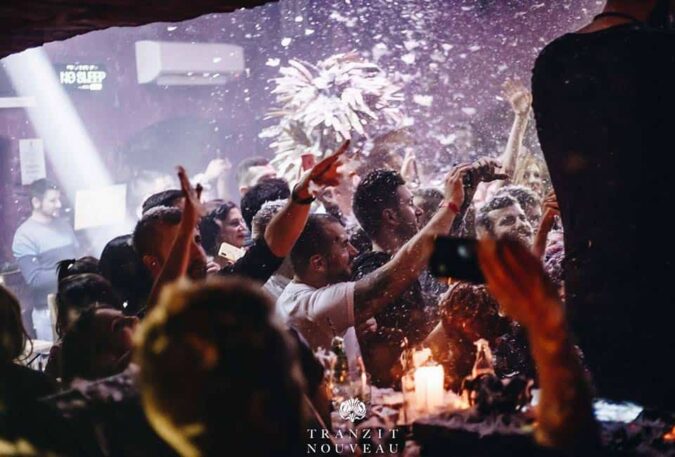What is Face Control?
Face control is a term commonly used in the nightclub scene to describe the selective process of letting certain people into the club and keeping others out. Unlike traditional lines, where entry is based solely on a first-come, first-served basis, face control involves a nuanced evaluation of patrons based on various subjective factors.
I explain all of this in my course Module 5, Lesson 7: How to Get into the Best Bars, Lounges, and Clubs, Click Here: Course
How Does Fact Control Work?
It depends on where you are, but in general, when you show up to a club that has face control, the bouncers and management are looking for the following:
Demeanor: Bouncers assess the demeanor and behavior of patrons as they approach the entrance.
Tip: I’d say, look like you belong, look like you’ve been in a club before.
Tip: As I’ve gotten older, and when traveling alone, I act like I’m a fellow club owner, investor, or businessman looking to do a deal, etc. Often management will grab and escort me right in.
Why Do Bouncers Reject People?
Or stated another way, what are some specific things they are looking for to let you in.
Confidence, politeness, and respectfulness can work in your favor, while aggressive or intoxicated behavior will obviously lead to refusal of entry.
Companionship: Who you’re with can influence the decision of the doormen.
Groups consisting of a balanced mix of genders or accompanied by attractive female companions are often given preference. I talked about this in the article: Solo Male Global Nightlife
Honestly, this is another great example of an advantage of traveling alone as a guy. It will be damn near impossible to get into an exclusive club with 7 guys with you.
Attire: Dress code plays a significant role in face control.
Clubs often have strict guidelines regarding attire, favoring upscale and fashionable clothing. Patrons dressed inappropriately may be denied entry.
Tip: Check out the club’s Instagram or Telegram to get an idea of the dress code. Then, whenever you’re in doubt, just wear a suit.
I’m not making this stuff up. I’ve been in clubs all over the world and face control is often real. Some more famous examples that you can simple Google are:

Examples of Face Control in Action:
In Moscow during the 2000s, prestigious nightclubs like Propaganda and Gipsy attracted a glamorous crowd, and entry was strictly regulated through face control.
Patrons needed to adhere to a dress code of chic attire and demonstrate sophistication to gain access.
Similarly, Studio 54 in New York during its heyday epitomized exclusivity with its discerning door policy. The club’s doormen were known for their selective approach, allowing only those deemed stylish and influential to enter.
I think there was even songs in the 70s or 80s about Face Control at Studio 54
Why Do Clubs have Face Control:
Face control has a profound impact on the atmosphere and clientele of a nightclub.
By curating the guest list based on specific criteria, clubs aim to maintain an aura of exclusivity and attract a desirable demographic.
Exclusive venues boasting stringent face control policies often cultivate an environment where patrons feel a sense of privilege and belonging, surrounded by like-minded individuals who meet the club’s standards of sophistication and style.
Is Face Control Racist?
However, the concept of Face Control also raises questions about inclusivity and fairness, as individuals who do not meet the club’s standards may feel excluded or discriminated against.
Face control decisions are inherently subjective, leaving room for biases based on factors such as race, appearance, or social status.
Critics contend that it perpetuates inequality and reinforces social hierarchies.
In my opinion, there may be some racism, but that is not the majority of situations. I’ve seen many White men refused entry and even some girls.
In fact, I was at a club in Miami years ago, and my guy friend and I got 7 or 8 girls together, and we wanted to get into an exclusive Miami nightclub. Unfortunately, the bouncer would not let us in because they said a few of the girls we were with couldn’t come in.
They said, “Our club is not for them.”
You can see how the exclusionary nature of face control can contribute to feelings of alienation and marginalization among those who do not fit the club’s idealized image.
Unfortunately, life is not always fair.
Or, you could tell the bouncers, “Nobody wants to come in your dumb ass club anyway.”
But suppose you do want to get in?
Navigating Face Control: Strategies and Considerations:
Given the significance of face control in gaining entry to exclusive nightclubs, patrons often employ various strategies to increase their chances of approval. These may include:
Having beautiful girls with you will always help. Especially, if you’re in a foreign country and the girls are local.
Dressing to Impress: Adhering to the club’s dress code and presenting oneself in upscale attire can significantly enhance one’s chances of passing face control. And a pro tip, knowing the venue will help you get in, ie. don’t dress like a Banker and try to get into a Hipster bar.
Leveraging Connections: Establishing connections with promoters, VIP hosts, or regular patrons of the club can sometimes provide a shortcut past face control.
Arriving Early: Arriving early before the venue reaches peak capacity can sometimes improve the likelihood of gaining entry, as doormen may be more lenient earlier in the evening.
In conclusion, while face control plays a significant role in shaping the atmosphere and clientele of exclusive nightclubs, it also poses ethical challenges regarding discrimination and inclusivity.
Have Fun!
